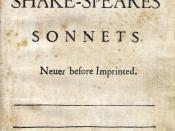Both poetics geniuses, William Shakespeare and Francesco Petrarch are connected forever in the literary realm, though the men themselves lived centuries apart.
The sonnet form prestigiously employed by William Shakespeare, as well as the famous poet-lover dilemma that most of his sonnets regard, came to him from a gifted writer who lived centuries before, the Italian Francesco Petrarch. Although Sir Thomas Wyatt (1503-1542), a contemporary of Martin Luther and Henry VIII, first introduced Petrarchan love poetry into England in the sixteenth century, it was Shakespeare who popularized it so remarkably that future generations would recognize and study it.
The writings of Wyatt introduced some variations in the customary sonnet format, occasionally exchanging the traditional Petrarchan form for a sonnet format featuring three quatrains and a closing couplet, with a different, but still specifically controlled rhyme scheme. This form is what is now mainly known as the Shakespearean Sonnet, named after its greatest practitioner.
Shakespeare uses both the Petrarchan and the Shakespearean structure in his sonnets. By Shakespeare's time the sonnet sequence was already a well established literary convention.
The Petrarchan convention of love developed as subject matter into both the faithful adoration of the idealized female lover and the anti-Petrarchan spiteful contempt for a person unworthy of love.
Francesco Petrarch, the creator of such a grand thematic tradition, was an Italian scholar, poet, and humanist, now mainly recognized for his poems addressed to a woman named Laura, an idealized beauty loved by Petrarch, whom he met in 1327 and who died in 1348. However, his love was not returned, thus her presence causes him ineffable joy, while also creating insufferable desires. All that is known of Laura is that she is enticing to look at, with golden hair, and her bearing is modest and dignified. It is known...


